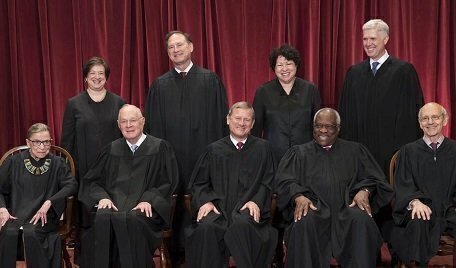On Wednesday, the Supreme Court heard a dispute in Ohio about who can stay on an official list of registered votes. And from the official transcripts, two critical Justices seemed to be questioning a challenge to the state’s policies.
 In about one hour of arguments, some members of court’s conservative and liberal wings seemed clearly on different sides of the case. But Justice Kennedy, the court’s usual swing vote on such matters, said little. And Stephen Breyer pondered the best ways to keep dead voters off the books. (Two Justices, Neil Gorsuch and Clarence Thomas, asked no questions during arguments.)
In about one hour of arguments, some members of court’s conservative and liberal wings seemed clearly on different sides of the case. But Justice Kennedy, the court’s usual swing vote on such matters, said little. And Stephen Breyer pondered the best ways to keep dead voters off the books. (Two Justices, Neil Gorsuch and Clarence Thomas, asked no questions during arguments.)
Husted v. A. Philip Randolph Institute considers a conflict between federal voting statutes and state-based programs to maintain voter registration lists by removing inactive voters. Ohio's program removes people from its list of registered voters if they don't respond to a notification after four years or vote again in that period.
In February 2017, Ohio Secretary of State Jon Husted filed a petition with the Supreme Court after the state lost a decision in the federal Sixth Circuit Appeals Court. Ohio believes that under the National Voter Registration Act of 1993 (or NVRA) and the Help America Vote Act of 2002 (or HAVA), it can start a “supplemental” process of voter purging for a person who “has not voted or appeared to vote in 2 or more consecutive general elections for Federal office.”
The Philip Randolph Institute challenged the state’s policy in 2016, claiming the voter-purging efforts eliminated a disproportionate number of lower-income and minority voters from the election process. It also contested Ohio’s interpretation of the federal laws that permitted voter inactivity as the “trigger” mechanism for maintaining voter rolls.
The lower courts were divided on the case. The Trump administration and 17 states friend of the court briefs supporting Ohio, while the NAACP, Common Cause and former attorney general Eric Holder field briefs supporting the Randolph Institute.
On Wednesday, Kennedy was more focused on the specifics of how people are contacted who have moved or changed their driver’s license. His only extensive comment was about one of the rationales behind Ohio’s laws. “The reason they're purging them is they want to protect the voter roll from people that … have moved and they're voting in the wrong district. That's the reason. What we're talking about are the best tools to implement that reason, to implement that purpose,” Kennedy said.
Justice Sonia Sotomayor brought up the right of people not to vote in an election, if they chose to do so, as a reason to take away their voter registration. "With Congress saying voting is a 'constitutional right,' can we allow you to use failure to vote as evidence of moving when people have a right not to vote if they choose?" Sotomayor asked Ohio’s attorney general.
Justice Samuel Alito voiced concerns about why it was objectionable for Ohio to take measures to keep ineligible voters off its rolls. “You think that if somebody hasn’t voted for 20 years, that doesn’t raise the inference that the person has moved or died?” Alito asked.
Breyer seemed to be working out a solution that addressed the desire of Congress to maintain legitimate voting rolls.
“I'm in Rhode Island. I see the statute. I know some people have died, maybe in Rhode Island, maybe outside. Maybe they've moved to California. I don't want them voting in my state or people pretending to be them voting in my state. What do I do?” Breyer asked the attorney opposing the state’s laws.
The Court will likely reach a decision in the case by the end of June. But it also could effect the election process in other states that have or may purse similar policies.







